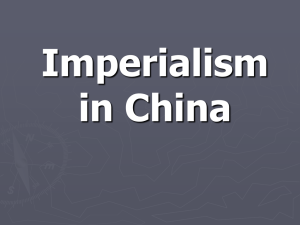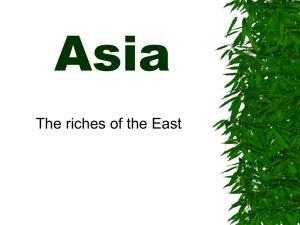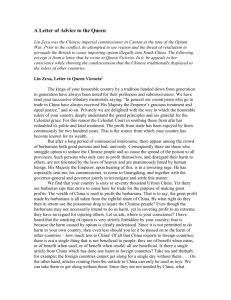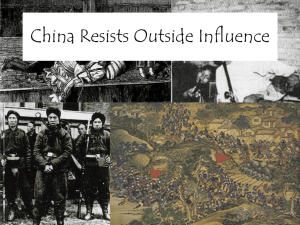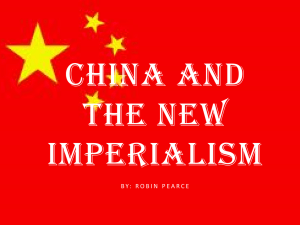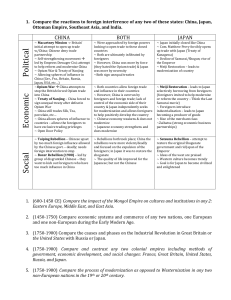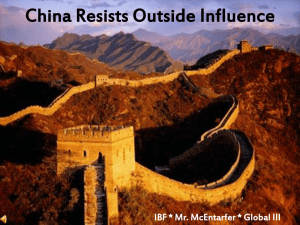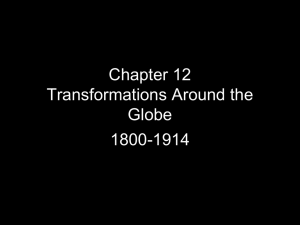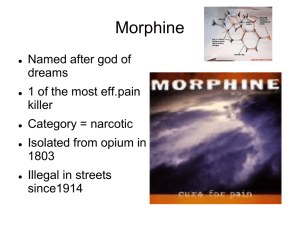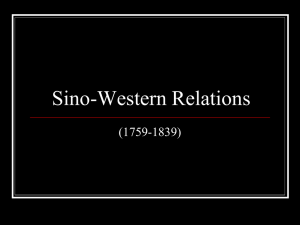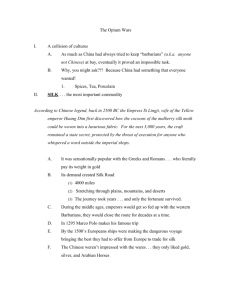Answer questions on a SEPARATE sheet.
advertisement
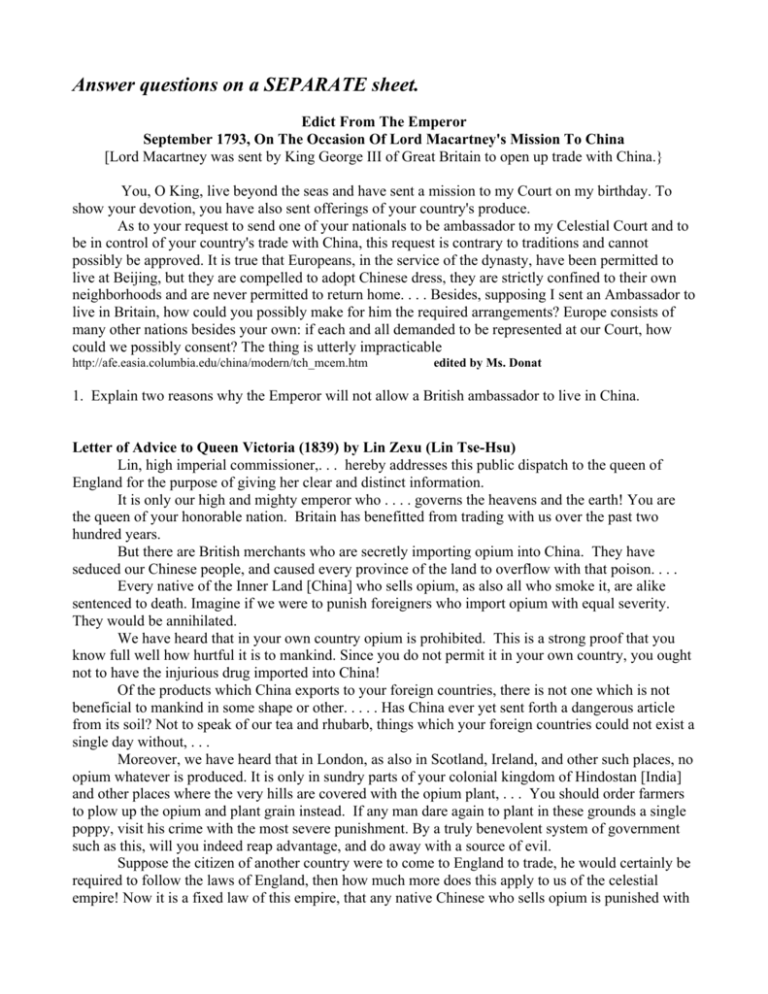
Answer questions on a SEPARATE sheet. Edict From The Emperor September 1793, On The Occasion Of Lord Macartney's Mission To China [Lord Macartney was sent by King George III of Great Britain to open up trade with China.} You, O King, live beyond the seas and have sent a mission to my Court on my birthday. To show your devotion, you have also sent offerings of your country's produce. As to your request to send one of your nationals to be ambassador to my Celestial Court and to be in control of your country's trade with China, this request is contrary to traditions and cannot possibly be approved. It is true that Europeans, in the service of the dynasty, have been permitted to live at Beijing, but they are compelled to adopt Chinese dress, they are strictly confined to their own neighborhoods and are never permitted to return home. . . . Besides, supposing I sent an Ambassador to live in Britain, how could you possibly make for him the required arrangements? Europe consists of many other nations besides your own: if each and all demanded to be represented at our Court, how could we possibly consent? The thing is utterly impracticable http://afe.easia.columbia.edu/china/modern/tch_mcem.htm edited by Ms. Donat 1. Explain two reasons why the Emperor will not allow a British ambassador to live in China. Letter of Advice to Queen Victoria (1839) by Lin Zexu (Lin Tse-Hsu) Lin, high imperial commissioner,. . . hereby addresses this public dispatch to the queen of England for the purpose of giving her clear and distinct information. It is only our high and mighty emperor who . . . . governs the heavens and the earth! You are the queen of your honorable nation. Britain has benefitted from trading with us over the past two hundred years. But there are British merchants who are secretly importing opium into China. They have seduced our Chinese people, and caused every province of the land to overflow with that poison. . . . Every native of the Inner Land [China] who sells opium, as also all who smoke it, are alike sentenced to death. Imagine if we were to punish foreigners who import opium with equal severity. They would be annihilated. We have heard that in your own country opium is prohibited. This is a strong proof that you know full well how hurtful it is to mankind. Since you do not permit it in your own country, you ought not to have the injurious drug imported into China! Of the products which China exports to your foreign countries, there is not one which is not beneficial to mankind in some shape or other. . . . . Has China ever yet sent forth a dangerous article from its soil? Not to speak of our tea and rhubarb, things which your foreign countries could not exist a single day without, . . . Moreover, we have heard that in London, as also in Scotland, Ireland, and other such places, no opium whatever is produced. It is only in sundry parts of your colonial kingdom of Hindostan [India] and other places where the very hills are covered with the opium plant, . . . You should order farmers to plow up the opium and plant grain instead. If any man dare again to plant in these grounds a single poppy, visit his crime with the most severe punishment. By a truly benevolent system of government such as this, will you indeed reap advantage, and do away with a source of evil. Suppose the citizen of another country were to come to England to trade, he would certainly be required to follow the laws of England, then how much more does this apply to us of the celestial empire! Now it is a fixed law of this empire, that any native Chinese who sells opium is punished with death, and even he who merely smokes it, must die. Pause and reflect for a moment: if you foreigners did not bring the opium here, where should our Chinese people get it? . . . .Therefore it is that those foreigners who now import opium into the Central Land are condemned to be beheaded and strangled by the new law. . . . Source: From: Chinese Repository, Vol. 8 (February 1840), pp. 497-503; reprinted in William H. McNeil and Mitsuko Iriye, eds., Modern Asia and Africa, Readings in World History Vol. 9, (New York: Oxford University Press, 1971), pp. 111-118. © Paul Halsall, October 1998 2. What product is Britain selling in China and why are the Chinese so angry about it? The Treaty of Nanking, August 1842 Article II The Emperor of China agrees that British Subjects, with their families, shall be allowed to reside, for the purpose of trade, without molestation or restraint at the Cities and Towns of Canton, Amoy, Foochow-fu, Ningpo, and Shanghai . . . . Article III It being obviously necessary and desirable, that British Subjects should have some Port whereat they may repair their Ships, when required, and keep supplies, the Emperor of China cedes to the Queen of Great Britain, etc., the Island of Hong-Kong, to be possessed in perpetuity by her Britannic Majesty, Her Heirs and Successors, . . . Article V The Government of China having forced the British Merchants trading at Canton to deal exclusively with certain Chinese Merchants called Hong merchants (or Cohong) who had been licensed by the Chinese Government for that purpose, the Emperor of China agrees to abolish that practice in future at all Ports where British Merchants may reside, and to permit them to trade with whatever persons they please, . . . Article VII Article IX payment details.. full amnesty [granted to all Chinese arrested for trading with British merchants] Important Additional Privileges Granted To Foreigners In Subsequent Treaties Most Favored Nation Status . . . . should the Emperor hereafter, from any cause whatever, be pleased to grant additional privileges or immunities to any of the Subjects or Citizens of such Foreign Countries, the same privileges and immunities will be extended to and enjoyed by British Subjects . . . China: A Teaching Workbook | © Columbia University, East Asian Curriculum Project edited by Ms. Donat Asia for Educators | afe.easia.columbia.edu http://afe.easia.columbia.edu/china/modern/opium.htm 3. List three key articles in the Treaty of Nanking in your own words..
